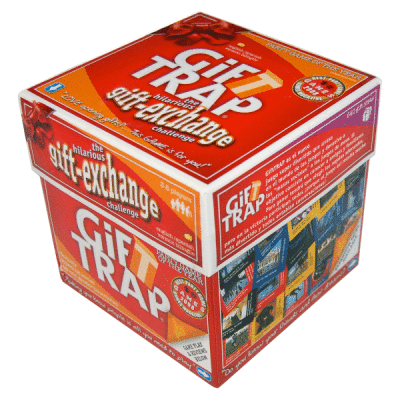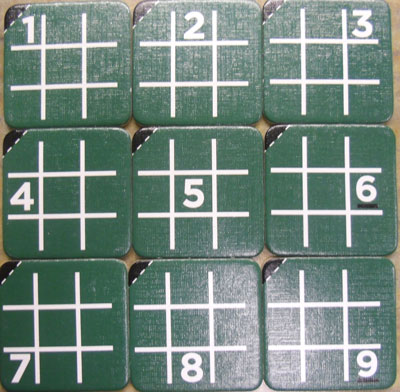Review: GiftTRAP
 Wednesday, June 8, 2011 at 01:57AM
Wednesday, June 8, 2011 at 01:57AM
 GiftTRAP: "The Hilarious Gift-Exchange Challenge"
GiftTRAP: "The Hilarious Gift-Exchange Challenge"
The Spin: “Play and discover the real you!”; “Do you know your friends and their dreams?”;
“Thinking you know people is all you need to play”; Imagine the gifts you’d exchange for real”
The Intro: The Nerdbloggers crew loves itself some deep, strategic board games. When it is just the core guys and gals gathered around a table, we can usually be found playing something meaty and brain burning. Often though, we game with “non-gamers,” and that means pulling out the dreaded party game. Actually, scratch that “dreaded” part. Mainstream party games are often crap (Scene-it, Cranium, Battle of the Sexes—I’m looking at you guys), though there are some good, popular party games (Balderdash, Taboo, Apples to Apples) released by the big companies. Even better, hobby game companies have managed to really expand the number of party games that can be enjoyed by gamers and non-gamers alike. In heavy rotation in our group are Wits and Wagers, Say Anything, Dixit, Telestrations and, recently, GiftTRAP.
The Game: GiftTrap is a simple game about gift-giving. The board is a three-by-three grid with spots for up to nine gifts. The game comes with more than 400 gifts split into four color-categories according to cost. Each player gets a small gift bag that contains his necessary pieces (9 tokens that represent each spot on the board, a opened-gift marker , a unopened-gift marker, and four tokens of different values with which to pick gifts).
One player begins by choosing a expense-level and placing gifts on the grid (one more gift than the number of players). Once the gifts are on the board, players now assign a gift to each player by giving them the token with that gift’s location printed on it. These look like little Tic-Tac-Toe boards with a grid location marked on it. These caused a bit of confusion with our younger players the first round, but things cleared up for them after the first go. It should be pretty clear cut for older players.
 The "Give Tokens" look like a game unto themselves.
The "Give Tokens" look like a game unto themselves.
Then, each player places their four tokens onto the board. These are valued as such (+3 for the gift the player would most like to receive, +2 for the next most desirable, +1 for final positive present, and -4 for the gift that the player would not want to receive).


